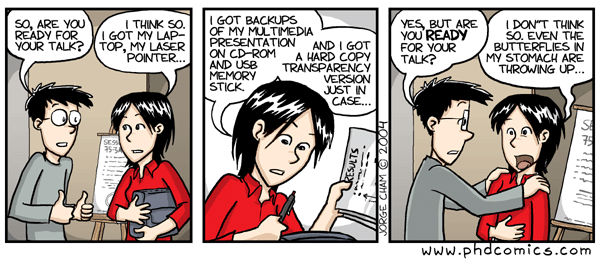
# How to give good feedback for practice talks
## _Preface_
Giving talks can be a very high-stakes activity for various reasons (e.g., person's first talk, person's job talk, person has a fear of public speaking).
It really helps to remember that, when giving feedback, advice will stick better if the person is in a good mental state to handle it.
_Also note: this is mostly advice given to me by [Hannah Rashkin](https://homes.cs.washington.edu/~hrashkin/), who gives very helpful and constructive feedback._
## During the talk, after the talk, or via email?
- **Before the talk**: be mindful and respectful of the types of feedback requested by speakers (e.g., if they explicitly say they still need to practice delivery, don't point out that their delivery needs work)
- **Take notes during** the talk (that you will email to the speaker afterwards)
- **Before emailing them**, edit your notes to adjust them based on what already was covered verbally after the talk, removing anything that's redundant or not particularly helpful given what was said or *re-wording* comments to be as constructive as possible
- **Think before giving feedback verbally**; could your feedback be better delivered via email? Verbal feedback should be as relevant as possible (e.g., if it's related to something someone else said)
## Feedback tips:
- "sandwich"-ing positive and negative feedback (again, people are much more receptive when they don't feel defensive)1
- a mix of high/low level comments (e.g., story structure to specific wordings on slides)
- Remain constructive:
- Keep advice actionable; be mindful of when the talk should be ready, and only give advice that can be implemented
- If you want to make a suggestion that's more high-level, try to list at least one concrete change that could help fix it
- Instead of saying "*I don't think it is \_\_\_ enough*," try making a suggestions instead "*I wonder if you could change it to be more \_\_\_*"
- Think about the feedback you received for your talks; what helped, and can you pay it forward?
- Avoid repeating feedback:
- that someone already gave the speaker
- that you already gave, and avoid talking at length about what you would do; the goal is to provide comments to the speaker, not for you to give the presentation yourself.
- Read the speaker's mental state:
- if they are nervous, I don't think it's really helpful to point it out
- if there is a specific thing they can change about the delivery (stop up-speaking, slow down, use more intonation, etc) putting that in an email helps, and try to keep it very positive
1Yes, compliment sandwiches are technically not sandwiches, [see this rant](https://medium.com/words-for-life/dear-people-who-use-the-phrase-compliment-sandwich-635824e5d2c)